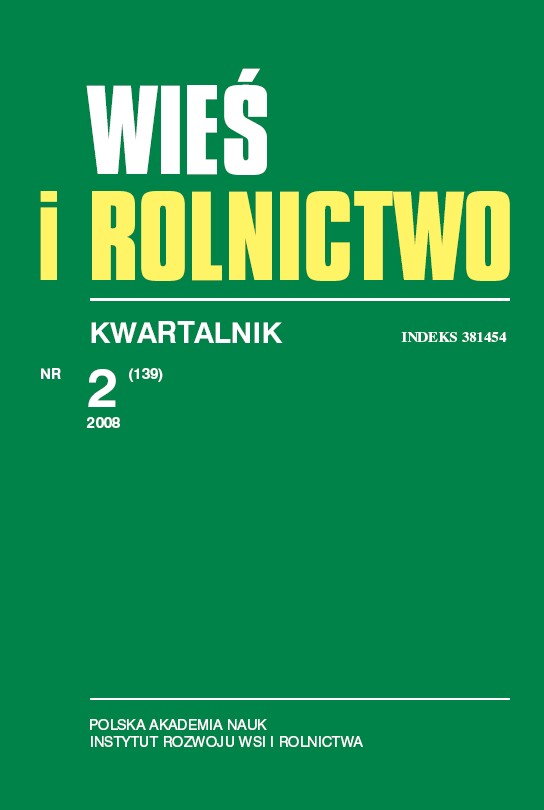Walory naturalnego środowiska jako determinant rozwoju turystyki wiejskiej w Wielkopolsce
DOI:
https://doi.org/10.53098/wir.2008.2.139/08Słowa kluczowe:
walory krajobrazowe, turystyka wiejskaAbstrakt
Obszary wiejskie stanowią cenne środowisko oraz stwarzają odpowiednie warunki dla rozwoju turystyki. Nasilająca się skłonność do wyjazdów w celach turystycznych na tereny wiejskie wartościowe przyrodniczo wiąże się z upowszechnianą na świecie ideą zrównoważonego rozwoju oraz z rosnącą w wyniku tego świadomością prośrodowiskową społeczeństw. Wiejska przestrzeń rekreacyjna oraz jej walory krajobrazowe mają zasadniczy wpływ na rozwój gospodarki turystycznej na terenach wiejskich. W artykule podjęto próbę identyfikacji walorów krajobrazowych województwa wielkopolskiego oraz dokonania typologii i oceny obszarów wiejskich województwa pod względem ich przydatności dla rozwoju turystyki. Przedmiotem badań były walory krajobrazowe województwa wielkopolskiego w przekroju 31 powiatów z uwzględnieniem czynników mierzalnych, współokreślających walory krajobrazowe obszarów wiejskich: powierzchnia o szczególnych walorach przyrodniczych prawnie chroniona (w % powierzchni ogólnej), lesistość (w % powierzchni ogólnej), jeziorność (w % powierzchni ogólnej), udział łąk i pastwisk w całości użytków rolnych (w %), liczba pomników przyrody na 1 km2. W badaniach wykorzystano następujące metody badawcze: grupowanie wielowymiarowe metodą Warda, waloryzacja grup miernikiem syntetycznym oraz regresja liniowa wielu zmiennych. Z przeprowadzonych analiz wynika, iż północne rejony Wielkopolski posiadają większy potencjał do wspomnianego rozwoju. Natomiast czynnikami, które w najwyższym stopniu wpływają na liczbę gospodarstw turystycznych w danym powiecie, są: jeziorność, lesistość oraz liczba pomników przyrody na jeden kilometr kwadratowy.
Bibliografia
Bott-Alama A., 2005: Uwarunkowania rozwoju turystyki wiejskiej w województwie zachodniopomorskim. Wydawnictwo Uniwersytetu Szczecińskiego, Szczecin.
Czyżewski A., Henisz-Matuszczak A., 2004: Rolnictwo Unii Europejskiej. Studium porównawcze struktur wytwórczych i regulatorów rynków rolnych. Wydawnictwo Akademii Ekonomicznej w Poznaniu, Poznań.
Dębniewska M., Tkaczuk M., 1997: Agroturystyka. Koszty, ceny, efekty. Poltext, Warszawa.
Everitt B., 1980: Cluster analysis. Halsted Press, New York. DOI: https://doi.org/10.1007/BF00154794
Iwicki S., 2006: Zagospodarowanie turystyczne obszarów wiejskich. Wydawnictwo Uczelniane WSG, Bydgoszcz.
Jalinik M., 2002: Agroturystyka na obszarach przyrodniczo cennych. Wydawnictwo Politechniki Białostockiej, Białystok.
Kożuchowski K., 2005: Walory przyrodnicze w turystyce i rekreacji. Kurpisz S.A., Poznań.
Majewski J., 1998: Turystyka wiejska-między rozwojem a ochroną dziedzictwa. W: Rozwój obszarów wiejskich w perspektywie integracji z Unią Europejską. Instytut Mikołaja Kopernika, Toruń.
Poczta F., 2006: Walory krajobrazowe a możliwości rozwoju turystyki na obszarach wiejskich. Maszynopis. Katedra Ekologii Człowieka, AWF, Poznań 2006.
Sokołowski A., 2002: Metody stosowane w data mining. StatSoft Polska.
Statsoft: STATISTICA (data analysis software system), version 6. StatSoft, Inc 2004 (www.statsoft.com).
Ward J.H., 1963: Hierarchical grouping to optimize an objective function. “Journal of the American Statistical” 58. DOI: https://doi.org/10.1080/01621459.1963.10500845
Wiatrak A.P., 1995: Czynniki określające rozwój turystyki na obszarach wiejskich. ,,Problemy Turystyki” 1–2.
Wysocki F., Lira J., 2003: Statystyka opisowa. Wydawnictwo Akademii Rolniczej w Poznaniu, Poznań.
www.miedzychod.pl
Pobrania
Liczba pobrań artykułu
Strony
Jak cytować
Numer
Dział
Licencja
Prawa autorskie (c) 2008 Wieś i Rolnictwo

Utwór dostępny jest na licencji Creative Commons Uznanie autorstwa 4.0 Międzynarodowe.










